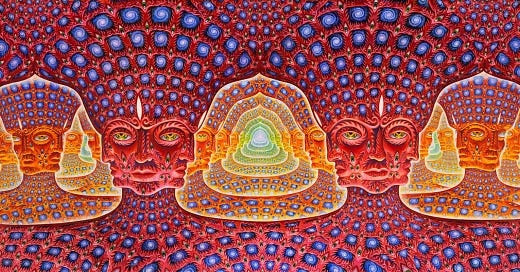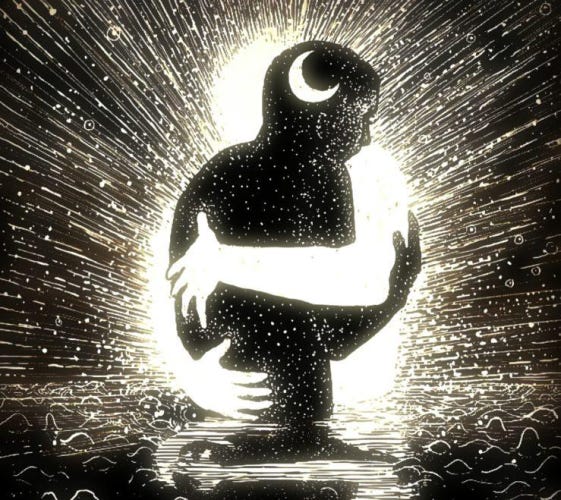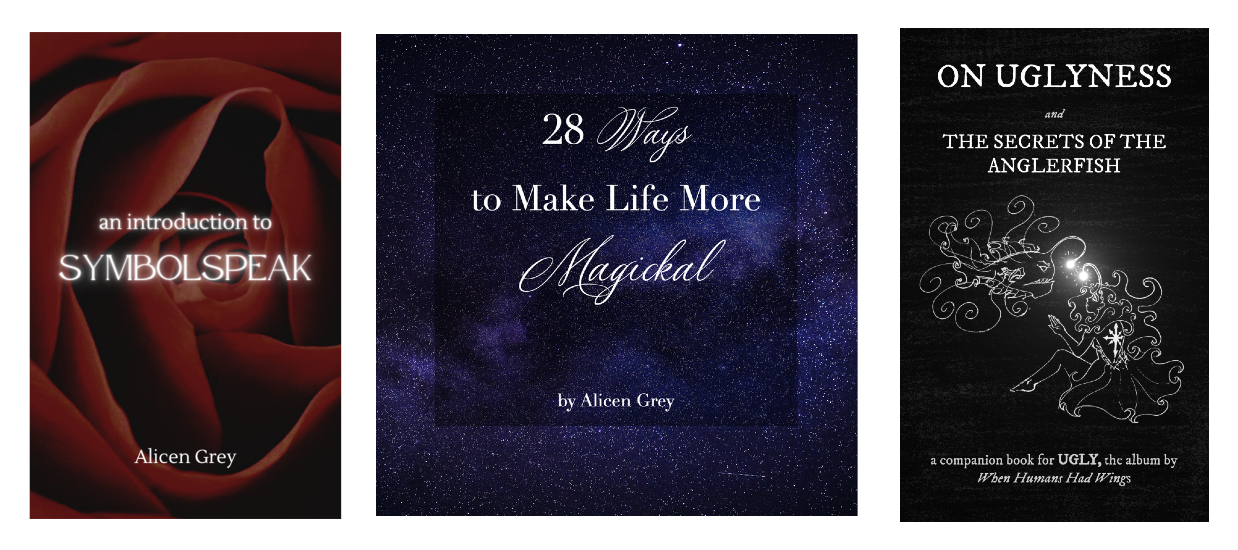GOD: THE GREAT HYPERDIMENSIONAL MIRROR
The version of God you get, is always the version you looked for.
In physics,
to polarize is to cause (something) to acquire polarity, which is, the state of having two opposite or contradictory tendencies, opinions, or aspects (e.g., ‘the polarity between men and women’).
Culturally, to polarize is to divide or cause to divide into two sharply contrasting groups or sets of opinions or beliefs.
Polarizing works of art are those that compel us to retreat to a black-and-white perception, lacking the nuance of grey. So we may respond with extreme love, even fanaticism — or, extreme hatred, disgust. In either case, there would be a noticeable lack of nuance or ambiguity in our response to said work of art.
As humans, black-and-white thinking is something of a default setting. We tend towards it, in all things. We even casually describe people as “black” or “white,” when nobody is literally black or white.
Black-and-white is just easy to grasp. The contrast, is convenient. The clarity of it, feels like safety. Familiarity. Comfort.

Grey, on the other hand, is frustrating. It requires us to look more closely at whatever incited our extreme reaction.
Grey threatens our sense of righteousness — of having it all figured out.
Grey offers neither safety nor danger. Grey gives everything its due consideration, regardless of how Black or White may feel about that. A perpetual traitor, never taking sides, Grey is loyal only to the exploration of the perspectives themselves.
I named myself Grey to initiate myself into the Great Work, or, the magickian’s ultimate aspiration of dissolving all opposites within themselves, into a state of completion, wholeness.
At the time when I chose my name, Alicen Grey, I was 16, and had just questioned Christianity — and the existence of God — for the first time. As the story goes, I was raised in an abusive Pentecostal church, forbidden from questioning anything. The one time I did, I was dragged to the altar to be exorcised in front of everyone. The humiliation of that experience was so scarring, you might even call it traumatizing. To this day, I struggle with the fear of being accused of being demon-possessed, or an evil witch.
Christianity, with its wrathful God, was all I ever knew. It was who I was.
But upon asking that first question — How do I know God is real? — and viscerally experiencing the instantaneous shattering of all I thought I knew, and all I thought I was — I realized I had stumbled upon a profoundly dangerous weapon: the question mark.
With no religion left to define me, I named myself: Alicen Grey. I was suddenly free now, to explore all the forbidden ideas that they had tried to scare me away from exploring.
Grey became my own personal, self-sourced religion. I fully embraced my inclination to question all things, to refuse to take sides on principle, to expose extreme cognitive distortions by shining my curious grey light on them. I created guiding principles for myself with which to explore the Grey Area, challenging the notion that one must have an ideology in order to have ethics.
I disavowed any and all ideological labels and identities. I became neither liberal, nor conservative; neither feminist, nor anti-feminist; neither gay nor straight… you get the picture.
The more I purposefully sought out the grey area in any debate or conversation, the more fluid and free I felt. I could swim over to the Black perspective, hear what they had to say… then swim over to the so-called enemy camp, and ask what White thought about the issue… And then go back to the center, holding both perspectives as equally valuable and insightful, but not necessarily right, and not necessarily wrong either.
Each and every time, either side thought they’d found a confidant in me. Somebody who understood. Somebody to represent them, to help spread their perspective to the others, to convert the world to their way of seeing.
Oh, to behold their disappointment, upon finding out that I never intended to validate them, or reassure them that their perspective is the correct one, or fight alongside them in their imaginary ideological wars.
Far from it.
I’m not a soldier; I’m a spy.
From the center, you can see all sides.
Nothing is, or can be, hidden in the Grey Area.
If you come into my circle expecting to be told how right you are, and that you don’t need to think anymore because you’ve already found the Truth, then I will make sure you leave my circle questioning the very foundations of your existence.
This is my power. My weapon. My astra.
Would you believe, I do this out of love?
Grey is the Zero Point into which all temporal identities disappear.
And the Zero Point is the source of all creation.
You can be anyone, and go anywhere, from here.
The Grey Area is where I’ve found my freedom.
I want you to be free, too.
It’s for this reason, that I’ve decided to create a series all about the very thing that got me started on the Grey path in the first place — arguably, the most polarizing topic of all:
God.
— God, specifically, as seen through the lens of Christianity — a religion that even I, Little Miss Look-At-Me-I’m-So-Grey, was still thinking in black-and-white about, until recently.
In my posts to come about esoteric/mystic/occulted Christianity, it is my intention to offer new, grey-ified angles by which to consider this ultra-polarizing religion, which has scarred so many of us. I am not a theologian, or a scholar, or a “certified expert” — whatever that even means. I simply wish to think out loud, in exactly the way that was denied me as a girl; I come bearing possibilities, and personal gnosis.
It’s my metaphorical alchemy-in-progress, if you will: turning the dark, dense lead of religious trauma into shining spiritual gold.
Religious Polarization
Polarization simply refers to two opposite things being unintegrated with each other. It’s a state of separation, extremes.
So when a work of art, or quote, or anything, is “polarizing” — meaning, we respond to it with either extreme love or extreme hate — oftentimes that thing is offering us a reflection of what’s unintegrated within ourselves. Our extreme reaction to the thing, usually indicates that we are “black and white” within — broken into parts, fragmented, instead of feeling complete and whole.
As within, so without, after all.
I can think of no work of literature more polarizing than the Christian Bible.
There is no book as openly scorned and mocked and criticized as this one — and yet, strangely, no book more popular and enthusiastically distributed all over the world!
Some call it “the Good Book.”
“The inerrant word of God Himself.”
They live their lives by it.
Others, burn it.
Hate it.
Roll joints with it.
Likewise, I can think of no word more triggering than “God.”
It’s become fashionable among non-religious people to avoid even saying the word God, replacing it with softer, more impersonal synonyms like “The Universe” or “Source.”
Some acknowledge a God but exclusively refer to it as the Goddess, as if attempting to correct a history’s worth of patriarchal oppression by giving God feminine pronouns.
Ironically, ultra-religious people have their own version of not saying the word God. Some orthodox sects will not even utter or write the word “G-D,” or any variants thereof, for they feel they aren’t worthy to do so.
God.
A word so charged with meaning, so incomprehensibly complicated, that it polarizes believers and non-believers alike.
And as I contended earlier, the more polarizing something is, the more urgently we should integrate it.
We don’t see things as they are. We see things as we are.
And perhaps this is the source of all the confusion about what, or who, God is.
Because God is, by definition, beyond mortal comprehension, anything anybody says about God is a revelation of who they are, more than it is a revelation of God.
Now, this does not necessarily mean that if you think God is a tyrant, then you’re actually the tyrant.
Rather: if you can only see the aspect of God that is a tyrant, then what’s actually being revealed may not be God’s true nature, but just your perceptual filter over God.
Your biases.
Your particular configuration of thinking patterns and cognitive distortions.
You.
From where I sit in the Grey Area, collecting perspectives, I’ve heard countless theories, all passionately made and compellingly presented:
“Jesus was God made flesh; the Savior of mankind!”
“No, Jesus was just a human who reached enlightenment.”
“Actually, he wasn’t even real! He was just a metaphor for the Sun.”
“All of you are wrong! Jesus is actually Lucifer!”
…
Everybody thinks they figured it all out.
Everybody’s blind to their own perceptual limitations.
In all things, as passionate as we may be in pursuit of Truth, maybe all we’re ever really doing is telling on ourselves.

God is a Hyperdimensional Mirror
“God” is a fractalline, kaleidescopic, tesseractic, psychedelic, prismatic, interactive, hyperdimensional mirror.
I say “God” in quotation marks because maybe God isn’t literally a mirror, but “God” as a concept in the human mind functions like a mirror, reflecting back on itself in infinity, like a diamond bending light inside its many facets.
By virtue of being beyond our comprehension, God acts like a screen upon which we project our own internal dramas and distortions.
So if there’s something we don’t like about “God,” well… we can change our mind… which then changes ourself… which then changes the reality we’re experiencing.
In fact, I think our innate ability to “create Heaven or Hell with our own perception” is exactly what was being depicted in the story of the Garden of Eden,
when Eve chose to trust the serpent’s claim
that God was evil, and was hiding something from her…
Continued in next post:
What Really Happened in the Garden of Eden
Welcome back to my “Chrysticism” series! Named a portmonteau of “Christianity” and “mysticism,” this Chrysticism series aims to illuminate the esoteric truths hidden in plain sight in the Christian Bible, including humanity’s potential for miraculous powers and physical immortality.
If you like my style, please subscribe!
If you know other people who’ll like my work, please share it with them:
You can support my work with a donation:
Ko-Fi • Stripe • Venmo
In addition to my writing, I offer other cool things, like these courses:
And these books:
And these shirts:
And these albums:
And other content across social media:













I think this quote from Anne Lamott dovetails nicely with your excellent post: "The opposite of faith is not doubt: It is certainty. It is madness. You can tell you have created God in your own image when it turns out that he or she hates all the same people you do."
I loved all of this but my favorite three words were: "to be continued"!